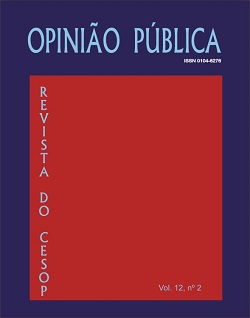Resumen
As organizações da sociedade civil têm um papel didático na instrução de seus membros sobre política que extrapola as questões imediatas de interesse dessas organizações? A maior parte da literatura, especialmente aquela sobre o orçamento participativo (OP) do Partido dos Trabalhadores do Brasil, sustenta que o OP é uma estrutura de oportunidade para que os indivíduos se reúnam e debatam não só problemas locais, mas também discutam política num sentido mais amplo. A mesma lógica se aplica a outras formas de militância, tais como participação em sindicatos, partidos políticos, associações de bairro e grupos de igreja. Este trabalho procura testar, usando dados longitudinais de opinião pública de eleitores brasileiros coletados nas eleições de 2002, se os militantes da sociedade civil organizada são, de fato, mais bem informados sobre política, especificamente, sobre questões eleitorais. Além disso, este trabalho testa também se potenciais diferenças de informação causadas por gênero, raça e classe são atenuadas pela participação em organizações da sociedade civil.
Abstract
Do civil society organizations have a didactic role in instructing its members about politics that extrapolates the immediate issues of interest of that organization? Most of the literature, especially that on the role of the participatory budgeting process of the Workers´ Party in Brazil, claims that such meetings are an opportunity structure for individuals to come together and not only debate their local problems, but also discuss politics more broadly. The same logic applies to other forms of activism, such as participation in Labor Unions, political parties, neighborhood associations and even church groups. This paper attempts to test, using a unique public opinion panel dataset of Brazilian voters collected in the 2002 elections, if activists are, in fact, better informed about politics, specifically, about campaign issues. In addition, the paper also tests if potential informational gaps caused by gender, race and class are attenuated by participation in civil society organizations.
Key words: political information, participatory budget, participation, public opinion, Brazil
Citas
ABERS, R. From clientelism to cooperation: local government, participatory policy, and civic organizing in Porto Alegre, Brasil. Politics & Society, v. 26, n. 4, p. 511-539, 1998.
ANDREWS, G. R. Racial inequality in Brazil and the United States: a statistical comparison. Journal of Social History, 26, n. 2, p. 229-263, 1992.
AUYERO, J. Poor people’s politics: Peronist survival networks and the legacy of Evita. Durham: Duke University Press, 2000.
AVRITZER, L. Democracy and the public space in Latin America. Princeton: Princeton University Press, 2002.
BAIOCCHI, G. Emergent public spheres: talking politics in participatory governance. American Sociological Review, v. 68, n. 1, p. 52-74, 2003.
DESPOSATO, S.; NORRANDER, B. Gender, religion and political participation in Latin America. Trabalho preparado para apresentação no 37º Congresso Mundial do Instituto Internacional de Sociologia, Estocolmo, 5-9 de julho 2005.
GAY, R. Popular organization and democracy in Rio de Janeiro: a tale of two favelas. Philadelphia: Temple University Press, 1994.
HOFFMAN, K.; CENTENO, M. A. The lopsided continent: inequality in Latin America. Annual Review of Sociology, v. 29, p. 363-390, 2003.
HUCKFELDT, R.; SPRAGUE, J. Citizens, politics, and social communication. Cambridge: Cambridge University Press, 1995.
KORZENIEWICZ, R. P.; SMITH, W. Poverty, inequality and growth in Latin America: searching for the high road to globalization. Latin American Research Review, v. 35, n. 3, p. 7-54, 2000.
LOVELL, P. Race, gender and regional labor market inequalities in Brazil. Review of Social Economy, v. 58, v. 3, p. 277-293, 2000.
REICHMAN, R. (ed.). Race in contemporary Brazil. University Park, PA: The Pennsylvania State University Press, 1999.
RENNÓ L. Estruturas de oportunidade política e ativismo cívico na América Latina. Revista de Sociologia e Política, v. 21, p. 71-83, 2003.
RENNÓ L. Mind the Gap: inequality and political information in the 2002 brazilian elections. Trabalho preparado para apresentação na Conferência Geral do Consórcio Europeu para Pesquisa Política, Budapeste, 7-11 de setembro 2005.
PORTES, A.; HOFFMAN, K. Latin American class structures: their composition and change during the Neoliberal Era. Latin American Research Review, v. 38, n. 1, p. 41-82, 2003.
SANTOS, B. S. Participatory budgeting in Porto Alegre: toward a redistributive democracy. Politics & Society, v. 26, n. 4, p. 461-510, 1998.
SELIGSON, A. Civic association and democratic participation in Central America: a test of the Putnam thesis. Comparative Political Studies, v. 32, n. 3, p. 342-362, 1999.
SKIDMORE, T. Brazil’s persistent income inequality: lessons from history. Latin American Politics & Society, v. 46, n. 2, p. 133-150, 2004.
TELLES, E. Race in another America: the significance of skin color in Brazil. Princeton: Princeton University Press, 2004.
VERBA, S.; SCHLOZMAN, K.; BRADY, H. Voice and equality: civic voluntarism in american politics. Cambridge: Harvard University Press, 1995.
A Opinião Pública utiliza a licença do Creative Commons (CC), preservando assim, a integridade dos artigos em ambiente de acesso aberto.

